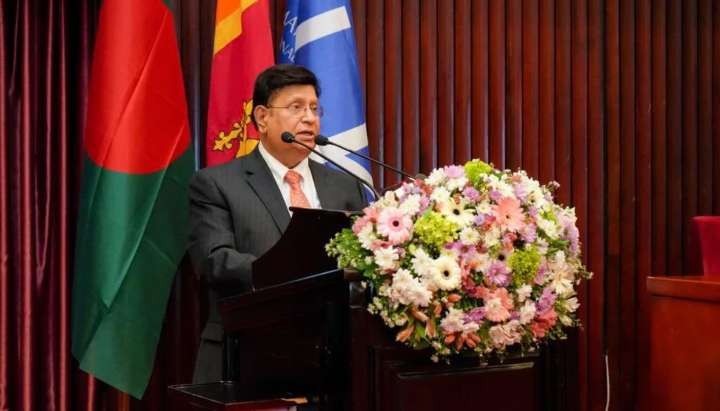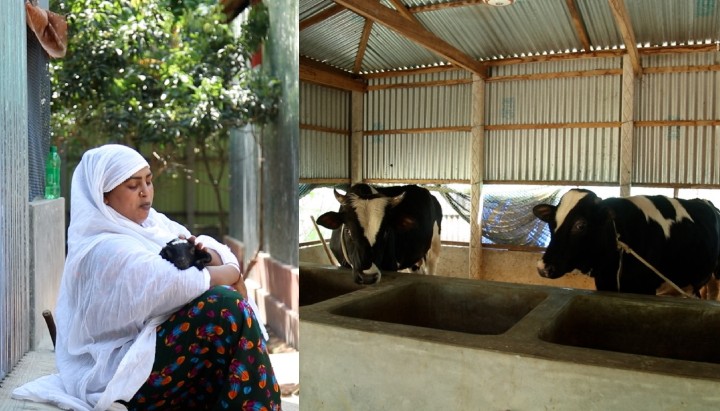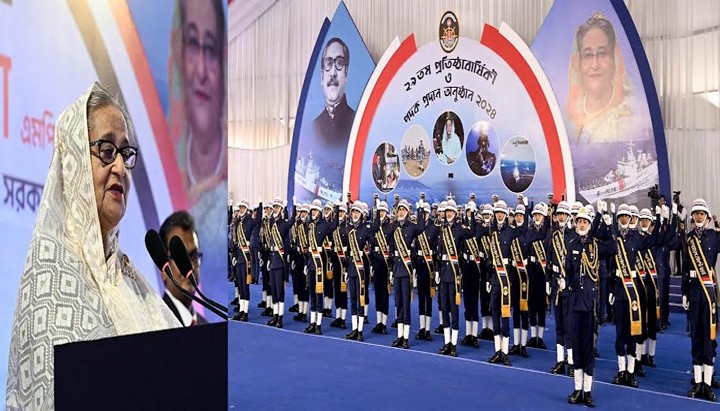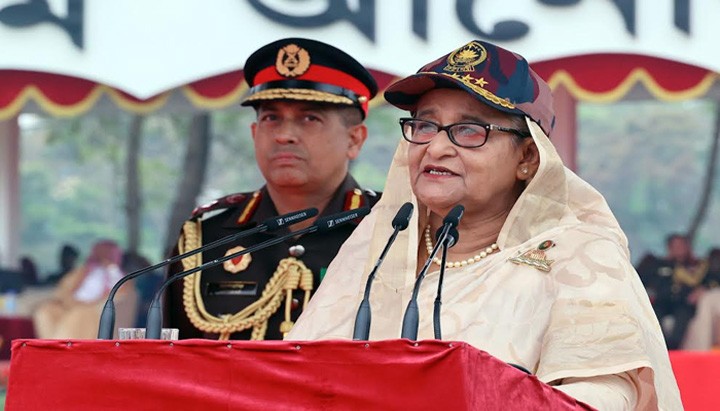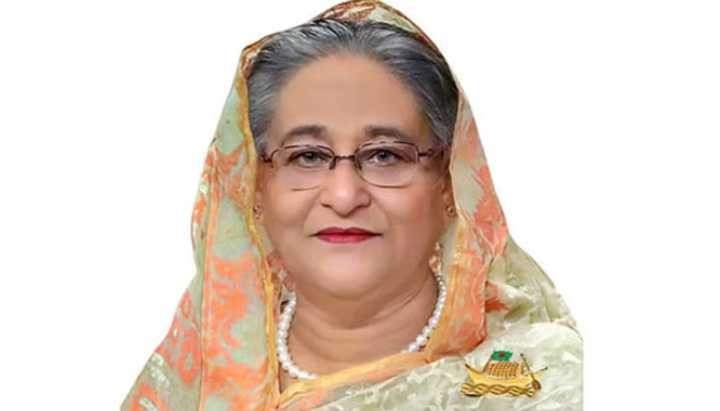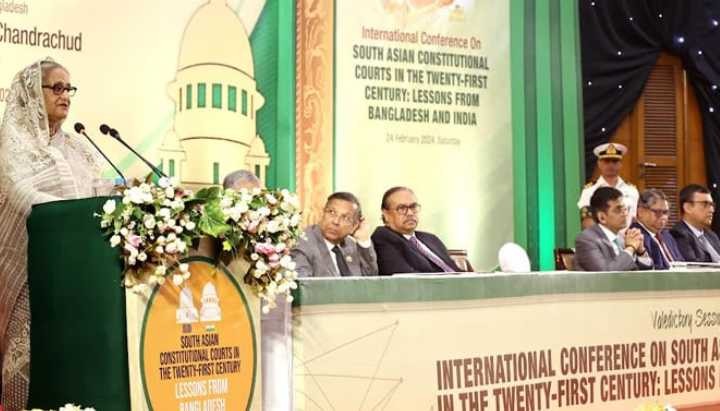The
Lakshman Kadirgamar Memorial Lecture 2023 titled ‘Shared Prosperity: A Vision
for South Asia’ was delivered by Bangladesh Foreign Minister Dr. A.K. Abdul Momen
at the Lakshman Kadirgamar Institute of International Relations and Strategic
Studies on 3 February. Following is his address:
Hon’ble
Foreign Minister Ali Sabry, Mrs. Suganthie Kadirgamar, Excellencies,
distinguished audience, ladies and gentlemen, a very good evening to all of
you. Ayubowan. Vanakkam.
I am
profoundly honoured to have the opportunity to deliver this prestigious
Lakshman Kadirgamar Memorial Lecture 2023. I thank Foreign Minister of Sri
Lanka Mr. Ali Sabry for this honour.
As an academician,
it is my immense pleasure to share my thoughts with the esteemed audience of
our close neighbour Sri Lanka. I am also happy to return to this beautiful
island in less than a year after the BIMSTEC Summit held in Colombo.
At the
outset, let me pay my homage to the late Mr. Lakshman Kadirgamar, one of Sri
Lanka’s finest sons. He was Foreign Minister during some of the most
challenging times in your recent history. Still, he steadily moved towards
achieving his dream to build a multi-religious and multi-ethnic united Sri
Lanka where all communities could live in harmony.
He was a
legal scholar and a leader par excellence. He served to raise the level of the
political discourse of Sri Lanka, both at home and abroad. His assassination
was one of the most tragic losses for the country. However, we are confident
that Lakshman Kadirgamar will be remembered by future generations of Sri
Lankans for the values and principles he lived and died for which are even more
relevant in present-day Sri Lanka.
I am aware
of the regard the late Lakshman Kadirgamar held for Bangladesh. I am also aware
that my Prime Minister Sheikh Hasina knew him well. Let me share an
anecdote.
During one
of his visits to Bangladesh, after meeting my Prime Minister, on the way out
she impromptu took him to the stage of her political, public meeting and
introduced him to the audience. He even spoke there for a few minutes. Mrs.
Kadirgamar, who is present here today, was a witness to that episode. That was
an indication of how highly late Kadirgamar was regarded by my Prime Minister.
Perhaps all these prompted Mrs. Suganthie Kadirgamar to think of hearing from
Bangladesh at this year’s Memorial Lecture. I am deeply touched by this
gesture. Thank you, Madam.
We see
this as an extension of collaboration between LKI and our think tank BIISS.
Distinguished
audience, today I would like to share my thoughts on the theme ‘Shared
Prosperity: A Vision for South Asia,’ which we hold very dearly to our
heart.
It cannot
begin without recalling our Father of the Nation Bangabandhu Sheikh Mujibur
Rahman who provided our foreign policy dictum, ‘Friendship to all, malice to
none,’ which he later focused more on promoting relations with neighbours
first. His able daughter Hon’ble Prime Minister Sheikh Hasina aptly picked up
the philosophy and extended it and went for its implementation.
Bangladesh-Sri
Lanka bilateral relations
Ladies and
gentlemen, before I delve into the theme, it would be pertinent to put
Bangladesh-Sri Lanka bilateral relations in perspective. The relationship is
based on a multitude of commonalities and close people-to-people
contacts.
Last year,
we celebrated the 50th anniversary of the establishment of our diplomatic ties.
We regularly exchange high-level visits, are engaged in bilateral discussions
on sectoral cooperation including shipping, trade and commerce, education,
agriculture, youth development, connectivity, and so on. Our relationship is
all about friendship, goodwill, and good neighbourliness. Therefore, it is
comfortable for me to speak before you in a broader perspective involving the
entire region’s development aspect.
Dear
friends, now, why do we think of a holistic approach to prosperity? It is
firstly due to the compulsion of the contemporary evolution of global order. We
are now going through one of the most significant phases of human history,
having already experienced an unprecedented Covid-19 pandemic.
Just as we
showed our capacity to tame the pandemic, another challenge came in our way –
armed conflict in Europe. This has not only slowed down our recovery from the
havoc done by the pandemic but also caused a global economic recession due to
increase in energy and food prices and more importantly, disruption of supply
chain and financial transaction mechanism owing to sanctions. Besides, we are
also victims of rivalry between big and emerging economies and their strategic
power play. All these necessitate developing countries to get together.
The vision
of shared prosperity becomes more relevant when we compare the development
trajectory of South Asian countries. Indeed, we have made substantial progress.
Some South Asian countries have already graduated to middle income status while
others are making their way. Yet, poverty is still high in the region.
One
predominant characteristic is that our economies display greater interest in
integrating with the global economy than with each other. Regional cooperation
within the existing frameworks has made only limited progress, being hostage to
political and security considerations. The problems have their roots in the
historical baggage as well as the existing disparity in the regional structure.
In addition, there are a number of outstanding issues and bilateral
discords.
All these
realities have left us a message that for survival, we need closer
collaboration among neighbours, setting aside our differences; we must have
concerted efforts through sharing of experiences and learning from each
other.
Inclusive
development
Distinguished
guests, in this backdrop, Bangladesh has been following a policy of shared
prosperity as a vision for the friendly neighbours of South Asia. Guided by
Prime Minister Sheikh Hasina, we are advocating for inclusive development in
the region. Our development trajectory and ideological stance dovetail our
vision of shared prosperity for South Asia. Let me tell you how we are doing
it.
In
Bangladesh, human development is the pillar of sustainable development. Our
Father of the Nation, Bangabandhu Sheikh Mujibur Rahman in his maiden speech at
the UNGA in 1974 said, and I quote: “There is an international responsibility
... to ensuring everyone the right to a standard living adequate for the health
and the well-being of himself and his family.” Unquote.
This
vision remains relevant even today. In that spirit, we are pursuing inclusive
and people-centric development in association with regional and global
efforts.
In the
last decade, we have achieved rapid economic growth ensuring social justice for
all. Today, Bangladesh is acknowledged as one of the fastest growing economies
in the world. We have reduced poverty from 41.5% to 20% in the last 14 years.
Our per capita income has tripled in just a decade. Bangladesh has fulfilled
all criterions for graduating from an LDC to a developing country. Bangladesh
is ranked as world’s fifth best Covid resilient country and South Asia’s best
performer.
Last year,
we inaugurated the self-funded ‘Padma Multipurpose Bridge’. A few days ago, we
started the first-ever metro rail service in our capital. Soon, we shall
complete the 3.2 km Bangabandhu Sheikh Mujibur Rahman Tunnel under the river
Karnaphuli in Chattogram, the first in South Asia. Several other mega-projects
are in the pipeline, which will bring about significant economic upliftment.
Our
aspiration is to transform Bangladesh into a knowledge-based ‘Smart Bangladesh’
by 2041 and a prosperous and climate-resilient delta by 2100. We hope to attain
these goals by way of ensuring women empowerment, sustainable economic growth,
and creating opportunities for all.
The
priorities of Sheikh Hasina Government are the following: first, provide food;
second, provide clothes; third, shelter and accommodation to all and no one
should be left behind; fourth, education; and fifth, healthcare to all.
To achieve
these goals, she promoted vehicles like ‘Digital Bangladesh,’ innovation,
foreign entrepreneurs and private initiatives in an atmosphere of regional
peace, stability, and security, and through connectivity. Bangladesh has become
a hub of connectivity and is looking forward to becoming a ‘Smart
Bangladesh’.
Foreign
policy
Ladies and
gentlemen, when it comes to foreign policy, we have been pursuing neighbourhood
diplomacy for amiable political relations with the South Asian neighbours
alongside conducting a balancing act on strategic issues based on the
philosophy of ‘shared prosperity’. I can name a few initiatives which speak of
our commitment to the fulfilment of the philosophy.
Bangladesh,
within its limited resources, is always ready to stand by its neighbours in
times of emergency – be it natural calamity or pandemic or economic crisis. We
despatched essential medicines, medical equipment, and technical assistance to
the Maldives, Nepal, Bhutan, and India during the peak period of the Covid-19
pandemic.
We had
readily extended humanitarian assistance to Nepal when it faced the deadly
earthquake back in 2015. Last year, we helped the earthquake victims of
Afghanistan. Prior to that, we contributed to the fund raised by the United
Nations for the people of Afghanistan.
Further,
our assistance for the people of Sri Lanka with emergency medicines during the
moment of crisis last year or the currency swap arrangement is the reflection
of our commitment to our philosophy. These symbolic gestures were not about our
capacity, pride, or mere demonstration, rather it was purely about our sense of
obligation to our neighbours. We strongly believe that shared prosperity comes
with shared responsibility and development in a single country of a particular
region may not sustain if others are not taken along.
In
addition, we have resolved most of our critical issues with our neighbours
peacefully through dialogue and discussion. For example, we have resolved our
border demarcation problem with India, our maritime boundary with India and
Myanmar, and also our water sharing with India peacefully through dialogue and
discussion.
Policies
and implementation
Dear
friends, for an emerging region like South Asia, we need to devise certain
policies and implement those in a sustainable manner. I would like to share
some of my thoughts which could be explored in quest for our shared prosperity
and inclusive development.
First of
all, without regional peace and stability we will not be able to grow as we
aspire. To that effect, our leaders in the region have to work closely on a priority
basis. We may have issues between neighbours but we have to transcend that to
leave a legacy of harmony for our future generation so that a culture of peace
and stability prevails in the region. We can vouch for it from our own
experience.
In Bangladesh,
we are sheltering 1.1 million forcibly-displaced Myanmar nationals. If it
remains unresolved, it has the potential to jeopardise the entire security
architecture of South Asia. So, here the neighbourhood should support us for
their own interests.
Second, we
need to revitalise our regional platforms and properly implement our
initiatives taken under BIMSTEC and IORA. We are happy that BIMSTEC is
progressing better, but we should endeavour to make it move always like a
rolling machine.
Third, we
need to focus on regional trade and investment. Countries in South Asia had
implemented trade liberalisation within the framework of SAFTA but on a limited
scale. Bangladesh is in the process of concluding a Preferential Trade
Agreement/Free Trade Agreement with several of its South Asian peers. We have
already concluded a PTA with Bhutan, are at an advanced stage of negotiations
for a PTA with Sri Lanka, and discussions for a PTA with Nepal are on. In the
same spirit, Bangladesh is about to start negotiations on a Comprehensive
Economic Partnership Agreement (CEPA) with India.
Fourth, a
well-connected region brings immense economic benefits and leads to greater
regional integration. To maximise our intra- and extra-regional trade potential
and enhance people-to-people contacts, Bangladesh is committed to regional and sub-regional
connectivity initiatives.
Bangladesh’s
geostrategic location is a big leverage which was rightly picked up by our
Hon’ble Prime Minister. She benevolently offered connectivity in the form of
transit and trans-shipment to our friendly neighbours for sustainable growth
and collective prosperity of the region. As for Sri Lanka, if we can establish
better shipping connectivity which our two countries are working on, the
overall regional connectivity would be more robust.
Fifth, we
live in a globalised world, highly interconnected and interdependent. Our
region has gone through a similar experience and history. Bangladesh believes
and promotes religious harmony. We have been promoting a ‘culture of peace’
across nations. The basic element of a ‘culture of peace’ is to inculcate a
mindset of tolerance, a mindset of respect towards others, irrespective of
religion, ethnicity, colour, background, or race.
If we can
develop such a mindset by stopping venom of hatred towards others, we can hope
to have sustainable peace and stability across nations, leading to the end of
violence, wars, and terrorism in nations and regions. There won’t be millions
of refugees or persecuted Rohingyas. Bangladesh takes special pride in it as
even before the Renaissance was started in Europe in the 17th century, even
before America was discovered in 1492, in Bengal a campaign was started by
Chandi Das as early as 1408 that says ‘humanity is above all and we still try
to promote it’.
Sixth, we
have to look beyond a traditional approach of development and challenges and
revisit the non-traditional global crises of the recent time. We are
experiencing food, fuel, fertiliser, and energy shortages due to global
politics and disruption of supply chains. As littoral and island countries we
face similar challenges of natural disasters; we have a vast maritime area
which needs effective maritime governance; we need to curb marine pollution and
ensure responsible use of marine resources. Our collective, sincere, and bold
efforts are required to minimise the impacts of climate change as well.
In this
context, I would like to share Bangladesh’s understanding and position.
Ocean
governance:
- Blue economy: Bangladesh is an
avid proponent of blue economy and responsible use of marine resources for
the benefit of the entire region. We are keen to utilise the full
potential of our marine resources and have developed an integrated
maritime policy drawing on the inter-linkages between the different
domains and functions of our seas, oceans, and coastal areas. Bangladesh
also values the importance of sound science, innovative management,
effective enforcement, meaningful partnerships, and robust public
participation as essential elements of the blue economy. At this
stage, we need support, technical expertise, and investment for
sustainable exploration and exploitation of marine resources. As the past
and present chairs of IORA, Bangladesh and Sri Lanka should find out ways
of bilateral collaboration particularly in the blue economy in the Bay of
Bengal.
-
- Controlling of Illegal,
Unregulated, and Unreported (IUU) fishing: IUU fishing in the maritime
territory of Bangladesh needs to be monitored and controlled. Our present
capability of marine law enforcement in this regard is limited. Here
regional collaboration would be very useful.
-
- Marine pollution: Marine
pollution is a major concern for all littoral countries. Microplastic
contamination poses a serious threat to the marine ecosystem. Responsible
tourism and appropriate legal framework underpinned by regional
collaboration would greatly help.
Climate
change and climate security in the Bay of Bengal: We have taken a
whole-of-government and whole-of-society approach to make the country
climate-resilient. Our Climate Change Strategy and Action Plan was formulated
in 2009. Bangladesh has pioneered in establishing a climate fund entirely from
our own resources in 2009. Nearly $ 443 million has been allocated to this fund
since then.
Moreover,
we are going to implement the ‘Mujib Climate Prosperity Plan’ to achieve low
carbon economic growth for optimised prosperity and partnership. Green growth,
resilient infrastructure, and renewable energy are key pillars of this
prosperity plan. This is a paradigm shift from vulnerability to resilience and
now from resilience to prosperity.
As the
immediate past Chair of the Climate Vulnerable Forum (CVF), we had promoted the
interests of the climate vulnerable countries including Sri Lanka in the
international platforms. Bangladesh is globally acclaimed for its remarkable success
in climate adaptation, in particular in locally-led adaptation efforts. The
Global Center on Adaptation (GCA) South Asia regional office in Dhaka is
disseminating local-based innovative adaptation strategies to other climate
vulnerable countries.
To
rehabilitate climate-displaced people, we have undertaken one of the world’s
largest housing projects which can shelter 4,500 climate-displaced families.
Under the ‘Ashrayan’ project, a landmark initiative for the landless and
homeless people, 450,000 families have been provided with houses. Keeping
disaster resilience in mind, the project focuses on mitigation through
afforestation, rainwater harvesting, solar home systems, and improved cook
stoves.
In
addition, the Government has implemented riverbank protection, river excavation
and dredging, building of embankments, and excavation of irrigation canals and
drainage canals in the last 10 years at a massive scale. We feel that our
national efforts need to be complemented by regional assistance.
As the
chair of CVF and as a climate vulnerable country, our priority is to save this
planet Earth for our future generations. In order to save it, we need all
countries, especially those that are major polluters, to come up with
aggressive NDCs, so that global temperature remains below 1.5 degree Celsius.
They should allocate more funds to climate change, they should share the burden
of rehabilitation of ‘climate migrants’ that are uprooted from their sweet homes
and traditional jobs due to erratic climatic changes, river erosion, and
additional salinity. We are happy that ‘loss and damage’ has been introduced in
COP27.
Seventh,
South Asia needs a collective voice in the international forum for optimising
its own interests.
Finally,
and most importantly, South Asian leaders need similar political will for a
better and prosperous region.
Dear
friends, we hope that Bangladesh and its neighbours in South Asia will be able
to tap the potential of each other’s complementarities to further consolidate
our relations to rise and shine as a region.
May I
conclude by reminding ourselves what a Bengali poet has said, and I quote:
‘Don’t be afraid of the cloud, sunshine is sure to follow.’
With this,
I conclude. I thank you all for your graceful presence and patience.
Joy
Bangla, Joy Bangabandhu!


